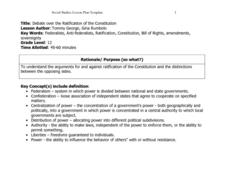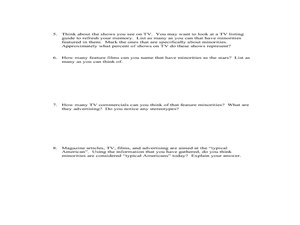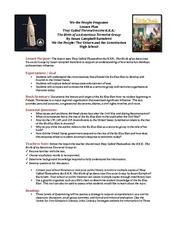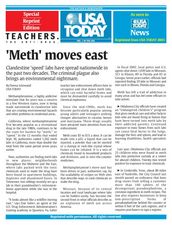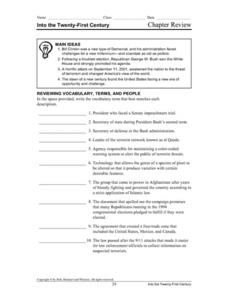Teaching for Change
A Documents-Based Lesson on the Voting Rights Act
How did the Voting Rights Act affect the daily lives of American citizens? A document-based lesson developed by the Student Non-Violent Coordinating committee (SNCC) presents a case study of the impact of the Voting Rights Act of 1965 on...
Curated OER
Statehouse Time Capsule
Fourth graders create a time capsule that is representative of their community. They explain why the chosen objects are representative of themselves or their community.
K12 Reader
Slavery in the Constitution
Your young historians will read excerpts from three parts of the United States Constitution—Article One, the Thirteenth Amendment, and the Fourteenth Amendment—and discuss how they each address the issue of slavery.
Defining US
Integration of Education and American Society
How did the struggle for Civil Rights during the 1950s transform American society and politics? Why are American schools integrated today? Class members explore these essential questions by examining a series of primary and secondary...
National Endowment for the Humanities
George Washington: The Precedent President
Everyone knows that George Washington was the first president, but do your scholars know why that was so important? The lesson plan, the third in a sequence of three, allows learners to understand how George Washington set a precedent...
Curated OER
George Washington: The Precedent President
Learners investigate precedents set during George Washington's term in office. They conduct Internet research, develop a list of the responsibilities of the President, match Washington's accomplishments with the list, and play a game.
Curated OER
China's 'One Child Policy'
Students use an extract from Beth Gilligan's Voices and Values: Citizenship in Asia (Curriculum Corporation, 1998, pp 29-30), together with other resources, as the basis for investigation and analysis of China's 'one child policy'.
Curated OER
Debate over the Ratification of the Constitution
Twelfth graders discuss the creation of the United States, the Articles of Confederation and the Constitution. Through a class debate, role-playing Federalists and Anti-federalists, they identify the reasons for and against ratification...
Curated OER
Minorities in Mainstream American Society
So many people fought for Civil Rights in the United States. Read about the Civil Rights Act of 1964, and discuss what the act guarantees. Then pass out a slew of magazines and encourage them to observe how often minorities appear in...
Utah Education Network (UEN)
Parenting Styles
Does your class know about different parenting styles and how each affects family dynamics or the children? This series of exercises invites consideration of the adult role of parenting. Everything you need for the lesson is included.
Curated OER
The Called Themselves the K.K.K.; The Birth of an American Terrorist Group
How did Ku Klux Klan develop and flourish in the US? How did the government respond to acts of terrorism conducted by the KKK following the Civil War? How does the government respond to acts of terrorism today? This resource...
Penn Museum
Africa
Mask wearing is not just for Halloween! This attractive and informative set of worksheets discusses this important African cultural tradition, as well as a variety of other significant cultural attributes to ancient civilizations, such...
Curated Video
Reporting - Flagging
While it may feel like you can post just about anything on YouTube, that's not the case. Teach your class about flagging inappropriate content. Learners watch a demonstration, practice flagging, and answer questions about online content.
Federal Reserve Bank
To Rent-to-Own or Not to Rent-to-Own?
Explore the key elements of a contract with your young adults, and delve into the features and unique benefits of a rent-to-own contract through discussion and worksheet practice.
Curated OER
USA Today Lesson: "Meth" Moves East
Students explore methamphetamine use. In this health journalism lesson, students read the USA Today article titled "Meth Moves East", respond to discussion questions regarding the article, and complete an activity based on the content of...
Curated OER
Racial Profiling
Young scholars explore racial profiling. In this Teaching Tolerance lesson, students discover what racial profiling is and then teach their classmates what it is as they write a news report or opinion essay. Young scholars may also...
Curated OER
I Didn't Do It! (Is Anyone guilty Anymore?)
Students explore the concept of "reasonable doubt" in our criminal court system and compare it to "preponderance of the evidence" in the civil court system. They discuss the trials of OJ Simpson and other historical criminal defendants.
Curated OER
Into the Twenty-First Century Chapter Review
In this United States into the 21st century worksheet, students review a chapter as they write 10 vocabulary words that match 10 descriptions, correct 1 false statement, and identify 2 themes from the new era of opportunity and challenge...
Curated OER
Search And Seizure In Washington
Students identify legal requirements of searches conducted with and without a warrant, and identify the legal standard for conducting searches in public schools.
Curated OER
Martin Luther King Jr. and Nonviolence
Students explore a local seat of government to examine ways to make changes in their communities. In this local government lesson, students read about Martin Luther King, Jr. and his nonviolent protests. Students read important dates and...
Curated OER
Writing As Criminal Evidence
Students research 2 famous forgery cases. For this forensics lesson, students are introduced to the methods of handwriting and paper analysis. They then use the Internet to study the cases of the Lindbergh baby and Howard Hughes'...
Curated OER
Going, Going, Gone
Students investigate how online auctions work and rate the assurances offered by specific auction sites and sellers. They, in groups, evaluate various auction sites, focusing on the site's and seller's predicted reliability; create...
Curated OER
More Harm Than Good?
Students explore the controversial 'harm reduction' approach to drug use and debate the various sides to this approach.
Curated OER
Your Role as a Taxpayer: Why Pay Taxes?
Students evaluate the basic rationale, nature, and consequences fo taxes. They describe why governments need taxes as revenue to provide goods and servicesin this series of activities.
Other popular searches
- Police and Law Enforcement
- History of Law Enforcement
- Law Enforcement Lesson Plans
- Law Enforcement Procedures
- Law Enforcement Careers
- Careers in Law Enforcement
- Algebra in Law Enforcement
- Crime Versus Law Enforcement
- Law Enforcement Surveillance
- Law Enforcement Officer
- Law Enforcement Oc Spray









